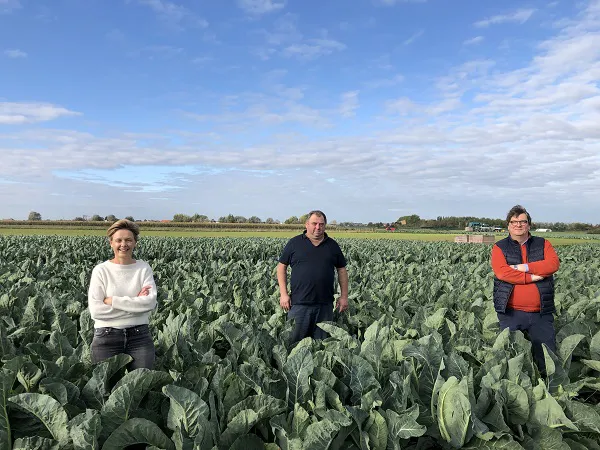The pandemic is still affecting the processing industry. The lockdowns disrupted logistics, which pushed container transport prices up. Those are putting pressure on, for instance, Brussel sprout sales in the U.S. In Belgium, some employees continue to work from home, which means fewer sales to the food service sector.
 Hilde Dhuyvetter, Johan Vanneste and Key Account Manager Luc De Waele from Ingro
Hilde Dhuyvetter, Johan Vanneste and Key Account Manager Luc De Waele from Ingro
"Customers are cautious and entering into fewer contracts. There's also still stock in cold storage. It's not a disaster; this season's agreed volumes are about the same as two years ago," says Luc De Waele. He is a Key account manager at Ingro, a Belgian industry vegetable growers' association.
Both the market and prices are under pressure. "Just about all the buyers say the same thing. They're not unhappy, but they're not ecstatic either. Things are just chugging along. They all agree on that." Buyers are cautious, especially those purchasing Brussel sprouts, one of Ingro's two largest crops. About 27% fewer of these have been contracted.
Cauliflower is the association's second-largest crop, and its acreage remains roughly unchanged. Spinach is down about two percent, and fewer beans have been planted. These products are not on the decline, but growers preferred to plant corn, a safer crop, this year. That is why there are fewer carrots too.
Processing fresh frozen vegetables is best done when it is done as close to harvesting as possible. In Belgium, growers and buyers have been working closely together since the 1970s. They have grown tremendously because of this, writes Brecht Demasure of the Center for Agricultural History. Important in the success is farms and processing facilities' proximity. Harvested crops reach the processing plant within two hours. The frozen food sector secures the supply via contracts, so growers know the prices and can plan their cultivation accordingly.
This year, the contracting process was difficult. Buyers and growers negotiated prices at length but could not find a middle ground, with growers even protesting. Ingro assumed a ten to 21% cost price increase, depending on the crop. Clients wanted to pay only three to five percent more. "It was a back and forth game with parties not accepting each other's proposals. Several growers jumped into the fray, which didn't help things. In the end, we compromised," says Luc.
Buyers undoubtedly benefited from that compromise being reached just before the war in Ukraine broke out. That has caused prices for products like wheat to climb. Alternative crops such as wheat and corn had already been attracting industry vegetable growers. These were fetching 30 to 40% and 35% higher prices, even before the war. Some growers with risky crops like beans had, therefore, already switched.
So, industry vegetable farmers have had a tough, risky start to the season. Buyer contracts were uncertain for quite some time. Since growers begin cultivation planning and buying seeds and planting material in early February, they had to take risks. It is going to be incredibly challenging for most crops to end this season profitably. According to Ingro, the agreed contract prices for some crops do not cover costs.
Due to inflation, grower costs should rise even more than estimated. Also, weather conditions, finding sufficient, suitable personnel, and the cultivation itself poses challenges. However, adjusting contracts is out of the question, Luc says. "The agreed prices will remain as is. Clients have their own problems, and they must be able to count on us," he concludes.
 For more information:
For more information:
Ingro
Email: [email protected]
Email: [email protected]
www.ingrocv.be
